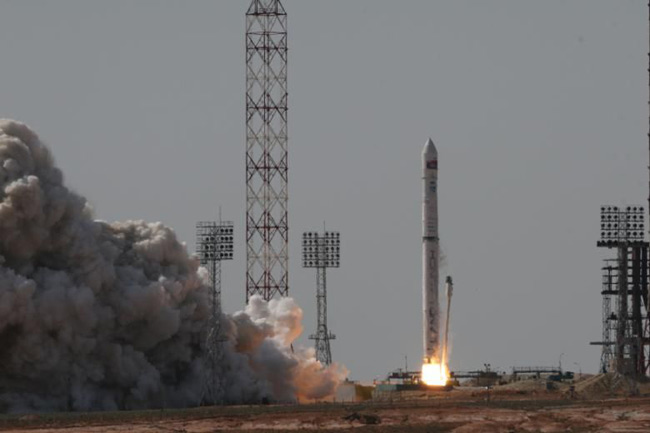Israeli Satellite Reaches Orbit in Land Launch Debut

PARIS --Israel's Amos-3 telecommunications satellite was placed successfully intogeostationary orbit on Monday aboard the inaugural flight of the Russian-UkrainianLand Launch system, setting the stage for what satellite-fleet operators hopewill be a lively competition between Land Launch -- affiliated with SeaLaunch Co. of Long Beach, Calif. -- and Russian Soyuz rockets launched fromEurope's equatorial spaceport.
Amos-3'sowner, Spacecomof Tel Aviv, confirmed that the 1,270-kilogram Amos-3 separated from LandLaunch's Block DM upper stage about seven and one-half hours after launchfollowing three Block DM ignition-and-coast sequences. Spacecom said thesatellite had sent initial signals and that its solar arrays had deployed.
Land Launchuses essentially the same rocket, the Zenit 3SL, as that operated by Sea LaunchCo. from a floating platform on the equator in the Pacific Ocean. The rocket launchedat 1:00 a.m. EDT (0500 GMT).
But LandLaunch, operated from Russia's Baikonur Cosmodrome in Kazakhstan at about 46 degreesNorth latitude, is capable of placing telecommunications satellites weighingabout 3,600 kilograms into geostationary orbit. The Sea Launch operation,because of its equatorial location, can carry satellites weighing more than6,000 kilograms to the same destination.
For thisinaugural launch, it was Space International Services (SIS) Ltd. of Moscow thatnegotiated the commercial-launch contract with Spacecom. Sea Launch, whichnormally markets Land Launch, was not involved. SIS is owned by the Zenit 3's Russianand Ukrainian builders.
For futurecommercial launches, Sea Launch will contract with SIS after booking orderswith satellite owners, a relationship similar to that between InternationalLaunch Services of McLean, Va., and the builders of Russia's Proton rocket.
Chicago-basedBoeing Co. is a 40 percent equity owner of Sea Launch but does not have anownership stake in Land Launch.
Get the Space.com Newsletter
Breaking space news, the latest updates on rocket launches, skywatching events and more!
Land Launchis going after the same commercial market as that to be served by a Europeanizedversion of Russia's Soyuz rocket. Starting in 2009, this Soyuz will be launchedfrom Europe's Guiana Space Center in French Guiana, whose location near theequator gives the vehicle the ability to loft satellites weighing slightly morethan 3,000 kilograms into geostationary orbit.
While thelargest commercial telecommunications satellites now routinely exceed 5,000kilograms in launch weight, demand for satellites weighing 3,000 kilograms orless remains robust.
- NEW VIDEO: Europe?s Galileo Test Satellite Takes Flight
- VIDEO: Europe Launches First ATV Cargo Ship
- IMAGES: 20 Great Rocket Launches
Join our Space Forums to keep talking space on the latest missions, night sky and more! And if you have a news tip, correction or comment, let us know at: community@space.com.

Charles Q. Choi is a contributing writer for Space.com and Live Science. He covers all things human origins and astronomy as well as physics, animals and general science topics. Charles has a Master of Arts degree from the University of Missouri-Columbia, School of Journalism and a Bachelor of Arts degree from the University of South Florida. Charles has visited every continent on Earth, drinking rancid yak butter tea in Lhasa, snorkeling with sea lions in the Galapagos and even climbing an iceberg in Antarctica. Visit him at http://www.sciwriter.us









